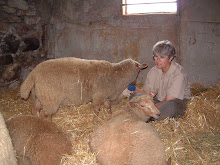Most of us have heard the story of the shoe maker's kids who ended up going barefoot. Well, it turns out that Bob and I are the shoe maker's kids when it comes to monitoring our nutrition.
Over the years we have researched the nutritional requirements for our horses, sheep and chickens, analysed their feed and supplemented to balance the vitamin and mineral deficiencies in our feed. Every year we ship hay samples out for analysis. Not only do we analyse the macronutrients such as protein, we also analyse the micronutrients such as selenium, copper and zinc.
Because of the region where we live, that is eastern Ontario, where the soil is deficient in some of these minerals, not surprisingly our hay is deficient in copper and zinc and totally lacking in selenium. So we carefully supplement for these deficiencies. And what about excess? Iron levels in our soil and in our hay are through the roof. We do not use commercial supplements for the horses because it is impossible to find one with no added iron. For a number of years, we have custom blended our own mineral supplements for the horses.
Over the years we also have expanded out vegetable gardens and rely more on them for producing our food. Our food production is not just a 100 mile diet, in most cases it is a 100 foot diet. This year we plan to build two small greenhouses to allow us to extend our growing season well into the fall and start it earlier in the spring. Our ultimate goal is to be as self sufficient as possible in our food production.
Now there are many of you out there that are cheering us on, what a great healthy, environmentally responsible diet. Yes it is but..... remember the hay analysis? If our soil mineral balance and deficiencies result in deficiencies in our hay, why would we not expect the same to happen with the fruits and vegetables that grown on the same land? And yes, after contacting Rob Wallbridge at SongBerry Farm, we can expect exactly the same deficiencies and inbalances in our veg and fruit. A quick web search showed that mineral levels in vegetables varied greatly depending on location, irrigation, etc. Mineral balance is necessary not only for plant health but also for our health.
So, what do we do? To begin with we are going to have our garden soil analysed and try to balance the minerals in the soil by additives such as kelp and fish meal. I would love to do that on a macro scale for the whole farm but the reality it is less expensive to supplement our livestock than to supplement the soil. The down side is the plants we are growing are probably not growing optimally. However that is the economic reality.
When I first had horses, I got caught in the popular trend to supplement them with a myriad of products to improve their health. Like with so many horse products, these supplements were expensive. Our feed costs were high and the horses did not seem to be benefiting in any obvious way. Then we started to analyse their diet through an on-line feed analysis Feed-XL (which by the way I can highly recommend). It turns out we were overfeeding the horses and under nourishing them. We were able to cut back our feed costs by hundreds of dollars a horse and still have them in great shape. So the lesson learned is we are not going to have the same knee jerk reaction to our own nutrition by automatically taking a range of supplements.
The next step is to talk to our doctors and get referred to a nutritionist. If it is possible to have our diet and us analysed and see if we do have inbalances then we will address them on an individual basis.
The net result should be healthier us... and the shoe maker's kids will wear shoes. That is the plan anyways. Stay tuned.
TTFN,
Laurie
Wednesday, April 3, 2013
Shoe-maker's kids
Labels:
fruits,
inbalance,
minerals,
nutrition,
self-sufficiency,
soil,
vegetables
Subscribe to:
Comments (Atom)

